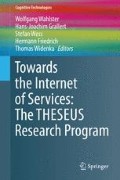Abstract
The Semantic Web came with the prospect of once providing amounts of information just as immense as those now available from the Internet, ready for evaluation and analysis by machines. About a decade later, more and more data hubs (a data hub is comparable to a web site) emerged that provide information free of charge. Massive amounts of such information, also called Linked Open Data (LOD), make the vision of the Semantic Web come to life. As an example, DBpedia – by harvesting information from Wikipedia – already contains hundreds of millions of general knowledge facts. Such data can be used to conveniently make information of general interest available to the public. Above this, the structure of this information and the fact that it is present in machine readable form renders possibly more structured ways of information access. One of these technologies is Question Answering (QA) – a task that always hinged on the availability of massive amounts of information. This paper reports on our approach to implementing a QA system backed by Linked Open Data. The QA system is part of the Alexandria use case.
Access this chapter
Tax calculation will be finalised at checkout
Purchases are for personal use only
Notes
- 1.
- 2.
- 3.
- 4.
- 5.
- 6.
- 7.
- 8.
An example of this pattern is DBpedia. It is fair to say that this structure arises from the infoboxes being harvested, not a general misconception, though.
- 9.
- 10.
- 11.
- 12.
- 13.
- 14.
- 15.
For German tokenization and POS-Tagging we use OpenNLP with some pre-trained models. (http://incubator.apache.org/opennlp/)
- 16.
- 17.
- 18.
- 19.
References
T. Berners-Lee, Weaving the Web: The Original Design and Ultimate Destiny of the World Wide Web (HarperBusiness, New York, 2000)
C. Bizer, J. Lehmann, G. Kobilarov, S. Auer, C. Becker, R. Cyganiak, S. Hellmann, DBpedia – a crystallization point for the web of data. Web Semant.: Sci. Serv. Agents World Wide Web 7(3), 154–165 (2009)
S. Brants, S. Dipper, S. Hansen, W. Lezius, G. Smith, The TIGER treebank, in Proceedings of the Workshop on Treebanks and Linguistic Theories, Sozopol, Sept 2002, pp. 24–41, http://scholar.google.com/scholar.bib?q=info:JVf6AeWs7nEJ:scholar.google.com/&output=citation&hl=en&as_sdt=1,5&ct=citation&cd=0
P. Cimiano, ORAKEL: a natural language interface to an F-Logic knowledge base, in Natural Language Processing and Information Systems, ed. by F. Meziane, E. Métais. Volume 3136 of Lecture Notes in Computer Science (Springer, Berlin/Heidelberg/New York, 2004), pp. 401–406, http://dblp.uni-trier.de/db/conf/nldb/nldb2004.html#Cimiano04
P. Cimiano, P. Haase, J. Heizmann, M. Mantel, ORAKEL: a portable natural language interface to knowledge base. Technical report, University of Karlsruhe, Karlsruhe, Mar 2007
D. Damljanovic, M. Agatonovic, H. Cunningham, FREyA: an interactive way of querying linked data using natural language, in The Semantic Web: ESWC 2011 Workshops, Heraklion, ed. by G. Antoniou, R. García-Castro, D. Fensel. Volume 7117 of Lecture Notes in Computer Science (Springer, Berlin/Heidelberg/New York, 2011), pp. 125–138, http://link.springer.com/chapter/10.1007%2F978-3-642-25953-1_11
M. Elhadad, J. Robin, SURGE: a comprehensive plug-in syntactic realization component for text generation. Technical report, Ben Gurion University, Be’er Sheva and Universidade Federal de Pernambuco, Recife, 1998
E.H. Hovy, Methodologies for the reliable construction of ontological knowledge, in Conceptual Structures: Common Semantics for Sharing Knowledge. Volume 3596 of Lecture Notes in Computer Science (Springer, Berlin/Heidelberg/New York, 2005), pp. 91–106
M. Kifer, G. Lausen, J. Wu, Logical foundations of object-oriented and frame-based languages. J. ACM 42(4), 741–843 (1995)
V. Lopez, M. Fernández, E. Motta, N. Stieler, PowerAqua: supporting users in querying and exploring the semantic web content. Semant. Web J. 3, 249–265 (2011). IOS Press, http://dx.doi.org/10.3233/SW-2011-0030
V. Lopez, E. Motta, V. Uren, PowerAqua: fishing the semantic web, in The Semantic Web: Research and Applications, ed. by J. Domingue, Y. Sure. Volume 4011 of Lecture Notes in Computer Science (Springer, Berlin/Heidelberg/New York, 2006), pp. 393–410
J. Nivre, J. Hall, J. Nilsson, A. Chanev, G. Eryigit, S. Kübler, S. Marinov, E. Marsi, MaltParser: a language-independent system for data-driven dependency parsing. Nat. Lang. Eng. 13(2), 95–135 (2007), http://dblp.uni-trier.de/db/journals/nle/nle13.html#NivreHNCEKMM07
T. Parsons, Events in the Semantics of English: A Study in Subatomic Semantics. Current Studies in Linguistics (MIT, Cambridge, 1990)
M. Wendt, M. Gerlach, H. Düwiger, Linguistic modeling of linked open data for question answering, in Proceedings of the Workshop on Interacting with Linked Data (ILD ’12), Heraklion, May 2012 (Central Europe (CEUR), 2012), pp. 75–86
Author information
Authors and Affiliations
Corresponding author
Editor information
Editors and Affiliations
Rights and permissions
Copyright information
© 2014 Springer International Publishing Switzerland
About this chapter
Cite this chapter
Wendt, M., Gerlach, M., Düwiger, H. (2014). Ask Like an Egyptian: Question Answering in the Alexandria Use Case. In: Wahlster, W., Grallert, HJ., Wess, S., Friedrich, H., Widenka, T. (eds) Towards the Internet of Services: The THESEUS Research Program. Cognitive Technologies. Springer, Cham. https://doi.org/10.1007/978-3-319-06755-1_23
Download citation
DOI: https://doi.org/10.1007/978-3-319-06755-1_23
Published:
Publisher Name: Springer, Cham
Print ISBN: 978-3-319-06754-4
Online ISBN: 978-3-319-06755-1
eBook Packages: Computer ScienceComputer Science (R0)

